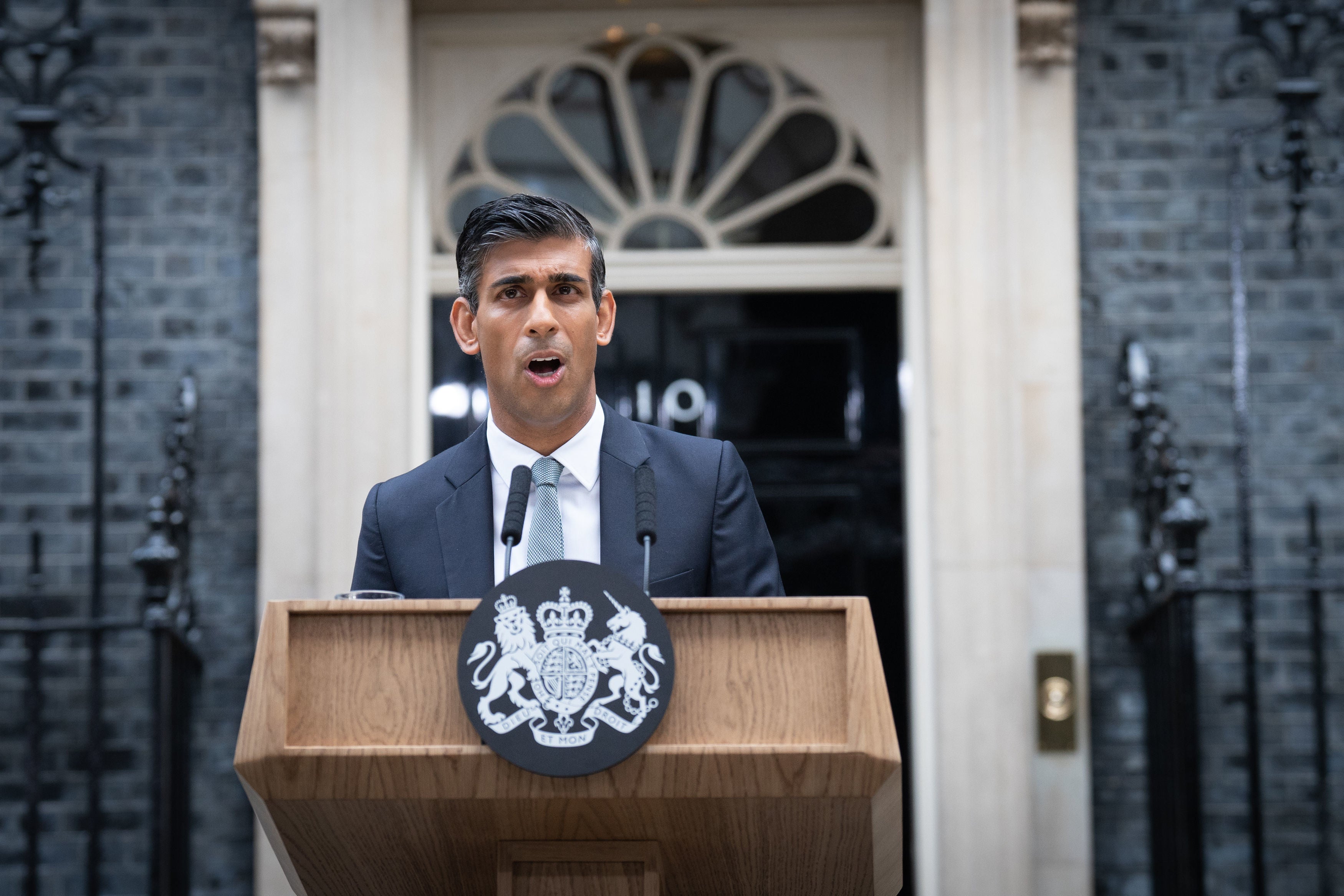The challenges ahead may overwhelm Rishi Sunak – a prime minister with no mandate
Editorial: Not the least of Sunak’s many difficulties in stamping his authority on government is that he lacks any real democratic legitimacy

The carpenters contracted by Downing Street have been busy lately. Britain’s diminutive new prime minister had his podium “customised”, rather like one of his expensive bespoke suits being altered. It’s a plain, no-nonsense shape.
Liz Truss, now an ex-prime minister at only 47 years of age, persevered with the “Jenga” design, which looks like whoever is speaking at it is about to be sucked into a downward spiral. It seems odd Ms Truss didn’t twig the unfortunate “optics”. Or perhaps not.
The contrast between outgoing and incoming premiers was of course about more than joinery. Rishi Sunak was more human than in some of his previous outings. During his rise to power, he was noted for his attention to presentational detail. This was certainly evident in his inaugural address as prime minister. He abandoned any autocue, which made him sound robotic and look glassy-eyed when he spoke in public after being elected leader of the party.
Mr Sunak put on his most serious face, and only the slightest hint of a smile could be detected on his lips as he prepared to enter No 10 for the first time as prime minister. His family was kept firmly out of the proceedings, presumably signalling that he wished to preserve their privacy, not make them even more vulnerable to press attention, and to stress that he has a job to do, and “the work begins immediately”.
Ms Truss, by contrast, had her husband and daughters with her as she went to see the King, and her speech was defiant to the point of arrogance about her disastrous time in office. Her delivery was as wooden as the post-modernist podium and she sadly stumbled over her quote from Seneca. It was poor.
Mr Sunak made up the deficit, however. After some generous words about his predecessor, he conceded that “mistakes” had indeed been made. He was also careful to lavish praise on Boris Johnson, but equally to strike an unspoken difference in style: “I will work day in and day out to deliver for you. This government will have integrity, professionalism and accountability at every level. Trust is earned. And I will earn yours.”
Mr Sunak presented himself with sincerity and humility, and with an unaccustomed eloquence. He warned once again about “difficult” decisions but tried to reassure the audience at home that these would be tempered with compassion. It was a good start.
Nonetheless, despite the grim-visaged determination, the challenges may yet overwhelm Mr Sunak. He and his closest allies may be clear-headed about what is needed to restore the public finances, but many Tory MPs remain averse to such tough choices, and still hopelessly prone to cakeism.
The Conservative Party is still addicted to factionalism and plotting, and many on the right have been bruised and alienated by the way Mr Sunak came to be leader. They will be joined by those dumped by Mr Sunak, such as Jacob Rees-Mogg. They are convinced that there was some kind of conspiracy either to usurp Ms Truss, or to sabotage Mr Johnson’s attempted comeback, or both. As with the regicide of Margaret Thatcher in 1990, the collapse of Mr Johnson’s government in July will reverberate for years, if not decades. He and Jeremy Hunt will find it difficult to get their Budgets passed.
Not the least of Mr Sunak’s many difficulties in stamping his authority on government is that he lacks any real democratic legitimacy. A ceremonial unanimous vote by Conservative MPs does not amount to a popular mandate. Mr Sunak lays claim to the 2019 general election mandate won by the Conservative Party – “the mandate my party earned in 2019 is not the sole property of any one individual”. Yet that doctrine is flawed for some obvious reasons.
The 2019 election was, after all, heavily dominated by Johnson and his plea to “get Brexit done”. It was not fought on the idea that Rishi Sunak (or Liz Truss for that matter) would be implementing what amounts to a heavy programme of renewed austerity. Indeed, Mr Johnson disowned the austerity programme forced through by George Osborne and David Cameron. Now public services face what Mr Hunt calls “eye-watering decisions”.
To keep up to speed with all the latest opinions and comment, sign up to our free weekly Voices Dispatches newsletter by clicking here
Constitutionally, there is no requirement for a general election now but politically the case is overwhelming – and, after the abolition of the Fixed-Term Parliaments Act, the constitution obviously permits elections before a statutory parliamentary term is complete.
So Mr Sunak could and should call one, and take his case to the country. The voters have been locked out of choosing its leader and their policies for too long, and Mr Sunak cannot succeed without public sentiment being on his side. And public sentiment, as evidenced in our latest polling, very much wants a general election now.
Some six in 10 want their say on the future of the country, and there is a general sense of bewilderment, if not revulsion, at the state of politics. Cabinet ministers come and go with dizzying frequency, and every government now has a temporary, “caretaker” feel. The instability has to end, and there is only one way to restore confidence in the entire system: let the people have their say, for a change.






Join our commenting forum
Join thought-provoking conversations, follow other Independent readers and see their replies
Comments